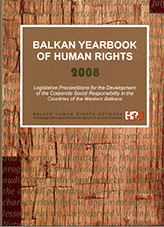Legislative Preconditions for the Development of the Corporate Social Responsibility in Macedonia
Legislative Preconditions for the Development of the Corporate Social Responsibility in Macedonia
Author(s): Albert Musliu, Zemri EleziSubject(s): Law, Constitution, Jurisprudence
Published by: Balkan Human Rights Network
Keywords: Corporate Social Responsibility (CSR); national legislation; international standards; employment practices; community impact
Summary/Abstract: The Report on Legislative Preconditions for the Development of the Corporate Social Responsibility (CSR) is a sublimate of the analyses of legal aspects for the development of corporate social responsibility in the Republic of Macedonia, as well as an attempt to draw general conclusions on the basis of the information and data available. Discussing the development of CSR in a country undergoing transition and rapid economic reconstruction is definitely a challenge. Transition in Macedonia has been associated with economic decline, impoverishment of workers, disappearance of the middle class, and widening of income disparities. The concepts of entrepreneurship and business came to be associated with values and appeals such as quick enrichment, predation, dishonesty, irresponsibility, and bending of rules. This widespread and enduring sociology of the "transition entrepreneurship" makes the debate on CSR, not premature as some would like to say, but as timely as it can be. This report discusses the legislative preconditions for the development of CSR in the country. Its focus is by and large on outlining normative provisions, but it also provides occasional qualitative comments on the reality of enactment of policies and legal provisions. Where possible, national legislation is compared and analyzed vis-a-vis international standards and the European Union acquis in particular. The report comprises two parts whereby the first focuses on employment practices and the second on community impact. The first part of the report covers the issues of: the right to association of workers, collective bargaining, forced & compulsory labor, child labor and minimum age for employment, the right to work and working conditions, and the issue of discrimination and violence at work. The second part on community impact looks into: the right to intellectual property, and property in general, minimum environmental safety, and product liability.
Journal: Yearbook of the Balkan Human Rights Network
- Issue Year: 2008
- Issue No: 01
- Page Range: 176-192
- Page Count: 17
- Language: English

